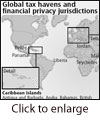Here is a suggestion that will likely lose all my liberal friends. Off shore financial centres are not the enemy and can provide a useful role. Surely off-shore financial centres are the drug dealers of modern finance? As with everything, the real story comes down to a little local politics. This past weekend, European leaders made further threats against off-shore financial centres. Which is interesting because the financial crisis that has enveloped us and should be attracting all the attention was a failure of domestic regulation in Europe and the US. It would have occurred if there were no off-shore financial centres.
One of the first institutions to fail in this crisis was Northern Rock, a very British institution where supervisors overlooked the fact that funding long-term mortgages of 120% of the value of homes in a mature boom, with short-term deposits, was running substantial risks. A German savings institution, IKB, was next. Bear Sterns, Merrill Lynch, Citigroup, Wells Fargo, Fortis, HBOS and the list goes on, were not brought down by shady dealings in off-shore financial centres out of the sight of regulators, but by an over-optimism that accompanies all booms and leads banks to lend too much. Growth of bank assets and an increasing reliance on short-term deposits or market finance was there for all to see in broad terms if not in specifics. These excesses are both systemic and commonplace and it is why we have financial regulators to regulate banks over and above standard corporate laws. In this respect Indian supervisors surpassed their European counterparts?perhaps knowingly.

The problem with focusing on domestic regulation is that it suggests that those in power were out to lunch as the largest financial crash was brewing. Instead, it is far nicer to blame shady foreigners. Let us be clear. We all know that the largest centres of lightly taxed and lightly regulated international finance are not actually ?foreign? to Europe, they are in London, Luxembourg, Switzerland and the Channel Islands?which are parts of the UK. But no, the focus isn?t on them, it is on small states who are not part of the global fora that will determine which off-shore financial centres are good and which are bad.
But this is an argument about hypocrisy, not why we should keep any off-shore financial centres. One of the reasons why politicians pick on off-shore financial centres is that the public have stylised views of secret bank accounts in Leichtenstein, Switzerland and beyond. We shall return to secrecy in a moment?it is the real issue. But let me explain the point of off-shore financial centres.
Imagine a car company that has its head office in Japan, but builds and sells cars in the US and is owned by Chinese shareholders. The company makes a profit from selling cars in the US and pays US corporation tax on its profits; it brings the proceeds into Japan and pays Japanese corporate taxes and then it sends the Chinese shareholder a dividend from which he pays Chinese income taxes. The same proceeds have been taxed three times. Alternatively, the Japanese car company sets up an off-shore company. When that off-shore company remits income back to the head-office it pays Japanese taxes, but when it takes US earnings and pays non-Japanese shareholders, it pays US taxes and the shareholder pays Chinese taxes. The off-shore centre acts as a ?way station?. There are no taxes in the ?way station? but that?s because the capital is in transit. Taxes are paid at the beginning and at the end of the journey, but not along the way. The source of abuse is not that the way-station is tax-free, it is whether the way station becomes a hiding spot for the origin of money, either to reduce taxes at the end of its journey, or to launder criminal money. The real problem is bank secrecy laws in off-shore financial centres, such as those that exist in Lichenstein and Switzerland.
The solution to that is to have tax information treaties that allow tax authorities who have grounds for suspicion to share information. Interestingly enough, most responsible off-shore financial centres have these. The ones that do not are primarily European or British protectorates like the British Virgin Islands.
What should happen is that the Europeans and British quietly tidy up their own house. They should sign tax information treaties, they should not mind global finance?with all its potential to destabilise their economies?being shunted to responsible financial centres, and they should focus on real efforts to strengthen domestic regulation. Instead they are loudly blaming others for a crisis of their own creation and are distracting themselves from doing what needs to be done domestically.
The author is chairman of London-based Intelligence Capital, governor of the London School of Economics and emeritus professor of Gresham College in the UK
















